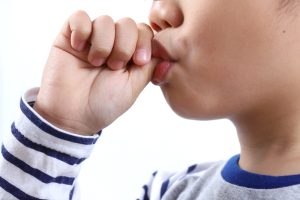Head banging can come as a bit of a surprise and, when ongoing, be quite distressful for all involved.
Kids may be banging their heads against a wall or on the floor during a tantrum or emotional outburst.
It may be because they are in pain with a headache or an ear infection and are unable to articulate that.
It may only be occurring at bedtime while your child is drifting off to sleep or ongoing during sleep.
They may bang their head repeatedly into their pillow, onto their mattress or sitting up onto the bedhead or wall. You may notice body rocking or humming as well.
Let’s go over some factors that may be driving or contributing to your child’s head banging.
Head banging during a tantrum or when under stress
Head banging can, in fact, be one type of repetitive behaviour your child uses in an attempt to self-regulate and calm themselves down during a tantrum.
Some kids, who have not developed sufficient communication skills or are unable to express their emotions, may resort to head banging to self-soothe.
Each of us have a window of tolerance in terms of how much we can deal with and how quickly or easily we react to stressful situations. Research is understanding that kids with repetitive behaviours may in fact be self-soothing and self-regulating their overwhelmed nervous system. We as parents may be concerned with trying to stop the abnormal behaviour when it may very well be more important to provide ways to avoid them going into ‘fight or flight’ mode and using these repetitive behaviours to self-regulate and self-soothe.
Here are some fantastic insights into the concept around ‘window of tolerance’ and ‘co-regulation’ as means to support these kids.
It is interesting to point out here that occupational therapists view repetitive movements as a powerful tool to self-soothe and regain focus and attention for kids with a sensory processing disorder.
Stress can be anything from troubles with siblings or friends, feeling the pressure at school, being too busy, past trauma, not getting the right foods to keep them physically and mentally supported, nutritional deficiencies, food sensitivities, toxin overload, heavy metal burden, and chronic health conditions.
Stress aside there can be other things contributing to emotional dysregulation and the accompanying repetitive behaviour such as head-banging. One of these is food additives.
Head banging and food additives
Food additives are pervasive in our food environment.
Some theorise that the reason why head banging generally starts around the 9-month mark is due to the expanding foods in a child’s diet and, in particular, the exposure to processed and packaged foods filled with additives such as preservatives, colours and flavours.
The effects of food additives are associated with the dose per weight of a child. A small child given the same amount of food containing food additives compared to a 5 year old is more vulnerable to the negative effects.
On top of that, the gut microbiome and liver are still developing in kids up until the age of 2. These are very important detoxification systems in our body to help us deal with ‘toxins’ in our food environment. A small child can easily become overburdened and unable to eliminate these ‘toxins’ from their body. These then can end up in other areas of the body causing inflammation and disrupting normal brain function and emotional regulation.
The most important substance in food linked to head banging is a colour called annatto 160b. This is often used in food processing as it is ‘natural’. However, some kids will have a very strong reaction to it. It is often found in a wide range of processed foods from breakfast cereal to ice cream. Even foods labelled ‘no artificial colours’ can still contain it.
Some kids are also more susceptible to the negative effects of food additives such as those with autism and ADHD.
Head banging and autism/ ADHD
Head banging can be one of the many behaviours reported in kids with autism and ADHD.
Just because your child is head banging does not mean they have one of these conditions. Again, it is important to look at the complete picture.
However, head banging can be an early sign of autism, especially those with more severe cognitive and communication impairments.
One connection here may be impairments in GABA signalling. GABA is a calming brain chemical and proper levels and functioning pathways assist with sleep and mood regulation. GABA balances out another brain chemical called glutamate. When glutamate is in excess, it can lead to hyperactivity, aggression and restlessness.
Autistic and ADHD kids often react to food additives and are also prone to sensitivities to foods such as dairy, gluten and a group of wholefoods high in natural food chemicals called salicylates and glutamates.
Head banging during sleep
Head banging during sleep is considered a type of rhythmic movement disorder (RMD) when it gets to a point that it leads to sleep disturbances and/or injury. Other types of sleep related RMDs include body rocking, rolling their head, body or leg, and leg banging.
These movements are more common in infants, around 60%, than kids at age 5, around 5%.
They most commonly happen just before falling asleep and during periods of light sleep.
There is no concrete understanding of why it happens from a western medical perspective. From our holistic approach, it is a matter of assessing the child as a whole to help pinpoint what may be driving and contributing to this sleep-related disorder.
A case report on an 8 year old with head banging during sleep alongside bed-wetting and ADHD found the use of melatonin beneficial. Melatonin is our sleep hormone and allows us to fall asleep at night. Melatonin has also been found to have antioxidant activity. The case study discussed the potential effect that melatonin had on the sleep-wake cycle and the dopaminergic pathways in the brain that are involved in movement disorders.
This is one example of how the complete picture needs to be considered as our next point highlights.
Head banging and potential benefits in infant development
Rhythmic movements including head and body rolling, head and leg banging and body rocking in infancy may, in fact, be beneficial. With its high prevalence in infants, with onset around 9 months of age, some research suggests that it may help promote motor development via vestibular stimulation. That is, the movement of the head can help stimulate reflexes in the brain that enhance our awareness of where we are in space to allow us to move from one position to the next in a coordinated way.
When should I be concerned?
If your child’s ongoing head banging is leading to disrupted sleep and consequential negative effects on daytime mood and energy, it is worth speaking to one of our practitioners to see what else may be going on. If your child’s head banging is coinciding with concerns in their behaviour and emotional regulation and/or leading to injury, get in touch with us today so that we can go through what may be driving and contributing to this ongoing behaviour.




